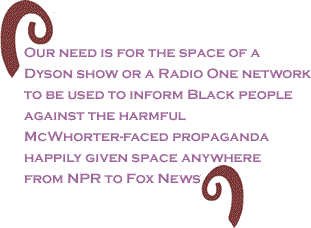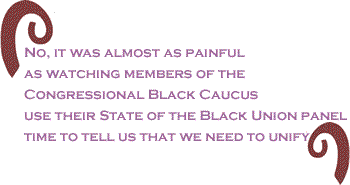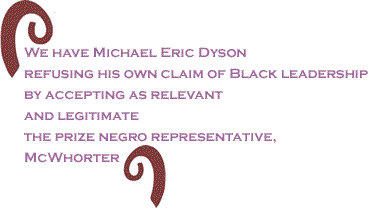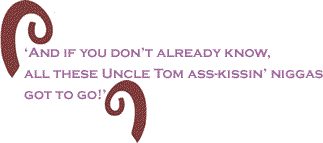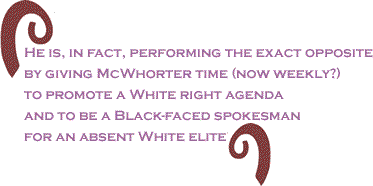
|
|||||||||||||||||||||
 |
|
|
I was loving the new Dave Chappelle's Block Party movie until Wyclef Jean brought me quickly out of my emersion in hip-hop/comedic heaven with that old crippling false optimism offered to the young. He gave them more of that tired stuff about how you can't "blame the White man," "nothing is holding you back," "work hard… stay in school… go to college…" and you can make it! All lies, every word and he knows it. Shoot, he had just finished singing to them his song "If I Was President" in which he explains "I would be elected on Friday" and "assassinated on Saturday." But we are conditioned to tell those lies. We can never honestly or plainly speak to the young (shit, or the old!) about a systemic, structural impediment to equality. It is eerily similar to the way we cannot speak openly or honestly about Black "leadership." And no one is more guilty of this kind of self-censorship than I. It was almost as bad as trying to watch this new show about "race shifting" and hearing a White man in Black-face express his anxious anticipation of getting his first Black-on-Black use of the word "nigger," or is that "nigga?" No, no, it was almost as painful as watching members of the Congressional Black Caucus use their State of the Black Union panel time to tell us that we need to unify and support the Tavis Covenant while not explaining to their loyal Black audience that they have yet to till their own fields in that respect. Wait! But the worst of all, however, was driving to work and listening to Michael Eric Dyson use his new Radio One WOL AM talk-radio show to pleasantly interview the Manhattan Institute's prize negro John McWhorter. It was simply too much for my tired and weary sensory receptors. That was the one that did it, that took me over the edge. Clef is a brilliant artist, the television show is, well, a television show. But Dr. Dyson is a self-proclaimed societal critic, an expert in Blackness and a spokesperson for Black America. He has very publicly alerted us to his presence and leadership. No, no. His actions are just simply worse in this case.
What this all has in common is a refusal (or inability) to properly, and/or publicly, expose the existence of systemic oppression and just how it works. This weakens us in perpetuity, by the generation. Dyson has by now positioned himself, not without skill or talent, as a ("the?") Black intellectual spokesman. He has, with super publication abilities, thrown down the gauntlet and said "I will carry the team coach!" He is fast approaching the remaining pantheon of "untouchable" Black public figures and more than that - by noticing his increasing appearances on shows like Democracy Now! - Dyson has also been selected by the White Left as a ("the?") Black-community spokesman. This means his willingness to engage a McWhorter further magnifies that negative impact on our community and further legitimizes McWhorter to his real audience - the White conservative right. And it was splendid Black talk radio theater. The two had a multi-segmented friendly back-and-forth with existing but softened disagreement measured equally by congratulatory phrases of "but I love him anyway." Dyson would softball loft flowery statements about socially and economically constructed inequity and then leave McWhorter to smash these out of the park with his fraudulently humble soft-spoken denunciations of these views as not addressing the real problems of Black cultural tendencies toward laziness. And even while mentioning his work for the The Manhattan Institute, so as to forever protect against a lack of full-disclosure, McWhorter was never taken to task for exactly what that means. Dyson passed on a wonderfully proper opportunity to use that teachable moment to expose these academic "Trojan Horses" to borrow from Dr. Martin Kilson's political example. By the way, since McWhorter was also invited by Dyson to make weekly visits to the show might we dare suggest he offer at least that much time to a Kilson? Then again, why bother with long-standing Black intellectual leading figures when White corporate hired-guns are available?
What Dyson needs to use his time and influence for (among other things) is the exposure of McWhorter-types lurking among us eager to take White conservative think tank money to explain our poverty and inequality as being the result of our own cultural flaws. McWhorter is the Black-face needed to sell us pigs' feet. He is paid well to colonially administer "scholarship" meant to lubricate the social-policy legislative piping, making it easier for the Manhattan Institute to achieve its goals. Those social polices, described in the pages of Black Commentator as the "Bright Line" issues against which this White right elite moves, often have their juridical justification penned by the likes of Manhattan Institute think tank academics, like McWhorter. This is about, as is explained quite clearly by the title of their own recent collection of essays celebrating the Institute's 25th Anniversary, Turning Intellect Into Influence. In this MI anthology Tom Wolfe happily tells the tale of a former World War II British fighter pilot, Anthony Fisher who, fearing the encroaching socialist movement in Europe, establishing in England the Institute for Economic Affairs to promote free-market ideology. His fears were not of politicians but of "powerful ideas, such as Marxism and Darwinism, that changed the course of history." And in 1978 he established that institute's North America cousin, the Manhattan Institute. Their goals? To promote "scholarship" targeted at influencing the influential to do their bidding, i.e. attack welfare, explain inequity as minority-group-pathology, promote law and order, etc. What results, according to legal scholar Derrick Bell - one named in that anthology among the liars to be watchful of - are national "policies towards blacks" which if "revised to require weekly, random round-ups of several hundred blacks who were then taken to a secluded place and shot, that policy would be more dramatic, but hardly different in result, than the policies now in effect, which most of us feel powerless to change."
Where does this powerlessness derive? It is, as Frantz Fanon noted, an "apathy so universally noted among colonial peoples… [resulting from] the reproach of inertia constantly directed at ‘the native' [which is] utterly dishonest." In this case it is the dishonest inertia created by, on the one hand, the White conservative right using nominally Black "scholarship" to, as Manhattan Institute spokesperson Peter Drucker explains, perform "a think tank's job" which is to "change minds." On the other we have Michael Eric Dyson refusing his own claim of Black leadership by accepting as relevant and legitimate that institution's prize negro representative McWhorter. From where is our Black resistance to come if corporate America's spokespeople get equal run on "our" airwaves invited by "our leaders," and, furthermore, invited as friends? Well, this requires us to revisit the question of "our." That this show (and I do mean "show") takes place on "our" Radio One is of no small consequence. I know my beloved hip-hop is controlled (excluded) from Radio One by Mary Catherine Sneed (who likes to be called "MC") the 53 year old White woman from Alabama with a background only in country music who determines that network's station play lists. And as BC has called our attention to Back republican Cathy Hughes, owner of Radio One, has decimated Black investigative journalism by piping in ABC News and promoting more "talk radio." (See BC, "Who Killed Black Radio News?") Uninformed talk radio. And in this most recent example, dangerously uniformed talk radio. Hey? Has Glen Ford, Executive Editor of The Black Commentator, been asked on Dyson's show? Of course not. He's not a corporate personage. But I also know that in this political climate it is ideological suicide to not offer some kind of solution (even if empty or impossible, somehow it makes us all feel better). It brings us that needed optimism I mentioned above. So here is that suggested solution for Dyson to go along with the previous suggestion that he make at least equal time for a Dr. Kilson. Dyson can read aloud the late Dr. Amos Wilson's chapter "The Policy-Formation Process" from Blueprint for Black Power. The chapter begins with quite an accurate description of "policy" and its purpose:
And, as Wilson explained regarding think tanks, their "intellectual output" is "utilized to inform and shape the thoughts and behavior of the media and politicians." Dyson, of them all, is best positioned to understand and resist this. But no. He is now in full participation of the process. But I know, I hear you. To some the idea of reading an entire chapter on air I am sure sounds boring. But with his fiery oratorical/preacher skills Dyson could make this good radio, he could pull it off I know it. He could even throw in a rap verse or two as he likes to do.
Chappelle took time in his film to highlight a lyric from Dead Prez, one that I might suggest for Dyson; "The White House is the [crack] rock house, Uncle Sam is the muthafuckin' pusherman, what I got to do to make sure you understand?" Or, perhaps more appropriately, another Dead Prez verse, "My momma work all her life and still strugglin', I blame it on the government and say it on the radio, and if you don't already know, all these Uncle Tom ass-kissin' niggas got to go!" Or perhaps Dyson could simply offer like-time to those who can properly explain what to McWhorter seems unexplainable (save for innate Black inferiority) how it is that the most rancid filth of our cultural expression is made popular. Dyson loves rap music and reminds us of that every chance he can. McWhorter says he does not much care for rap but discusses it because today "you just have to." But neither properly explain or explore how that cultural expression is so highly managed and to what political end. McWhorter has said on The Bob Costas Show that hip-hop glorifies violence and so ignorantly displays the Black cultural inferiority that plagues us and prevents community improvement. And if the "gangsta" stuff wasn't enough of a problem he comes back more recently and trashes "conscious rap" too as empty and so devoid of politics or activism that "it offers nothing to the struggling black woman with children trying to make the best of things after her welfare time limit runs out." Neither does free-market-capitalism or tax cuts for the top 1% but, hell, if Mos Def can't lyrically lead the revolution then forever let him be damned! In his most recent Op-Ed McWhorter in similar fashion takes aim at Aaron McGruder, creator of The Boondocks. He chastises McGruder for his "juvenile politics" and says that these politics make "good theater." "But," McWhorter wonders, "in 1963, the march on Washington demanded desegregation and voting rights. What exactly would the people at the gates be asking for today? If most Great Society programs did not work, what magic cure is white America holding back today?" McWhorter's deluded lie against history and contemporary reality is what Chappelle has said of certain kinds of high-quality racism, "it's magnifique!" It really is good. It is not an easy point to correct, particularly in the typical highly concise moments between commercials. It's a structural reality in mainstream media that McWhorter-types exploit to the hilt. Spout a bunch of soft-skulled conventional wisdoms and duck and dodge, interrupt or disrupt your opponent if one is provided or simply wait out the time when alone. Never worry, commercial media has made sure we never get more than a handful of minutes before the "next commercial break." It's an intellectual rope-a-dope that need only last briefly. Then boom! One more popular sound-byte and off to get that Institute pay check. But Dyson is just who we would think could be a withstanding force, and after all, it's his damn show! But, again, all we got were pretty sounding rhetorical flourishes said simply so Dyson could pass a lie-detector test if asked "well did you offer any disagreement?" Largely, however, McWhorter was given free reign to make his points against the slightest resistance.
And, most importantly, there absolutely are long lists of unmet grievances we "people at the gates" are asking be addressed. One with which I am most closely associated involves the hip-hop both Dyson and McWhorter discuss whether out of love or obligation. So, here is another suggestion; have my colleagues at Industry Ears, Lisa Fager and Paul Porter, or DaveyD or even lil' ole' me help explain to Dyson, McWhorter or others how a 4-company "musical OPEC" (as described by Greg Palast) ultimately determines what we hear and see musically and what impact this has. Let us explain with meticulous detail how it, in fact, is mostly elite-White-men who are able to determine or manage popularity and the global image of Blackness. Even conservative, elite, power player Zbigniew Brzezinski has noted how US dominance over global media and entertainment industries is what will set this country apart from empires of the past. Both Dyson and McWhorter need late passes on this one. Given this media environment and structure all popularity is fraudulent to the extent that it is generated by a tightly interconnected elite. If McWhorter is genuinely interested in discovering structural impediments to, or "magic cure[s]," for Black progress and is at least willing to suffer through discussions of hip-hop out of absolute coerced necessity, then Dyson should challenge him to discuss the industry that selectively signs and promotes one form of the expression over others; how payola; play lists; copyright; media consolidation; and a historical legacy of misshaping Black popular image to justify that community's exploitation all conspire today to leave us with a highly managed Black popularity conducted via the mechanism of a hip-hop and larger music/entertainment industry. Anyone who thinks we have devolved from a Paul Robeson to a 50 Cent accidentally needs a real awakening, one they should be getting via Dyson. If the stance to not accept the presence at all of McWhorter-types is too heavy, then, and my point ultimately here is, challenge him. And if Dyson cannot we have those who will. Dyson certainly could have alerted McWhorter (if he in fact does not know) that Black America does have remarkable agreement on key central issues - those highlighted as "Bright Lines" - not to mention any number of other problems regarding education or how about mass incarceration? And that there are "magic cure[s]" being withheld by White America and almost all of them are tucked nicely away in unwritten or unsigned legislation or all the public policy never developed due to the crushing influence of corporate America's think tanks and their negro henchmen or spokespeople. My CBC Monitor colleague Leutisha Stills has more properly dealt with this elsewhere but let me add that this is precisely the problem with members of the CBC using their time at the State of the Black Union to accept praise from Tavis while offering an appearance of unanimity. But as we have begun alerting folks to the fact that there hardly is such uniformity among CBC members in terms of these Bright Line issues and this disunity has everything to do with corporate money poisoning that body much like it has poisoned academia, public policy and even Dyson's show. Congressperson and CBC member Sheila Jackson-Lee, while promoting a need for Black America to unify politically so that she and the CBC could be empowered to enact Smiley's Covenant, did not see it fit to mention that she just entered our defined Black consensus after wallowing with a C-grade on our first report card. And Mel Watt, as reported by my esteemed colleague Ms. Stills, has already noted that even an A-grader like himself cannot instill CBC unification, which says what about corporate ability to divide a Black Caucus? We have no luxury of offering McWhorter-styled buffoons more time than they already get to be those White right spokespeople. Dyson is guilty in this instance of what I once wrote to Tavis after seeing him genuflect before Wal-Mart CEO and Tavis Smiley Show sponsor H. Lee Scott - to his credit he even read my comment on-air (thanks bruh!). That it is quite the media trick to claim a tough one-on-one interview with someone when in reality it is a public relations opportunity for that person to dismiss claims against them in a largely uninhibited manner. It is not the same as, say, having someone expertly expose that guest/subject or to at least have qualified opponents there to dispute defensive claims made by that guest. But even to offer tough questions to a respondent still allows them to, in an unfettered manner, respond as they like. To reshape the spin. All of this done, of course, in highly concise moments between commercials. Dyson has any number of qualified people to whom he can reach out to dispute, dismiss and/or discredit a McWhorter. Not only is he not performing this basic task of a Black leading intellectual but he is, in fact, performing the exact opposite by giving McWhorter time (now weekly?) to promote a White right agenda and to be a Black-faced spokesman for an absent White elite whose very existence McWhorter can then use his "blackness" to refute. Our need is for the space of a Dyson show or a Radio One network to be used to inform Black people against the harmful McWhorter-faced propaganda happily given space anywhere from NPR to Fox News. His Black anti-Black rhetoric will forever get play in commercial, corporate, White media. We have no time nor the luxury to attempt "balance" in such a highly imbalanced society. Dyson should, if he doesn't, know better. Jared A. Ball, Ph.D. is a professor of African American and Media Studies at the University of Maryland and Frostburg State University. He is a co-founder of CBC Monitor, co-host of The Blackademics on Pacifica's WPFW 89.3 FM in Washington, DC and the founder/creator of FreeMix Radio: The Original Mixtape Radio Show whose history and details can be found at voxunion.com. Ball is also the managing editor for the nation's first academic hip-hop journal which is part of the larger non-profit work of Words, Beats and Life, Inc. |
|
| Home | |
Your comments are always welcome. Visit the Contact Us page to send e-Mail or Feedback or Click here to send e-Mail to [email protected] e-Mail re-print notice
If you send us an e-Mail message we may publish all or part of it, unless you tell us it is not for publication. You may also request that we withhold your name. Thank you very much for your readership. |
|
| March
16, 2006 Issue 175 |
||||||||||||||
|
||||||||||||||
|
||||||||||||||
| Printer Friendly Version in Plain Text or PDF format. Download free Adobe Reader. | ||||||||||||||
 |
||||||||||||||
 |
||||||||||||||
 |
||||||||||||||
| |
||||||||||||||
| |
||||||||||||||






















